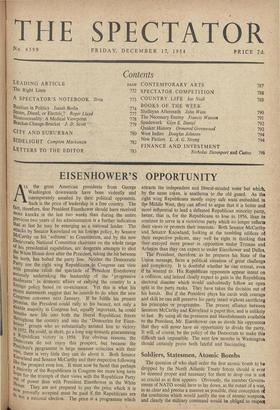EISENHOWER'S OPPORTUNITY .
LL the great American presidents from George Washington downwards have been violently and intemperately assailed by their political opponents.
Such is the price of leadership in a free country. The fact, therefore, that President Eisenhower should have received More knocks in the last two weeks than during the entire Previous two years of his administration is a further indication that at last he may be emerging as a national leader. The attacks by Senator Knowland on his foreign policy, by Senator McCarthy on his ' softness' to Communism, and by the new Democratic National Committee chairman on the whole range of his presidential capabilities, are desperate attempts to shut the White House door after the President, taking the bit between his teeth, has bolted the party line. Neither the Democratic Party nor the right wing Republicans in Congress can view With genuine relish the spectacle of President Eisenhower seriously undertaking the leadership of the ' progressive moderates' in domestic affairs or rallying the country to a foreign policy based on co-existence. Yet this is what his recent statements suggest that he intends to do when the new Congress convenes next January. If he fulfils his present Promise, the President could rally to his banner, not only a 8,17-able majority in Congress but, equally important, he could breathe new life into both the liberal Republican forces Illroughout the country and into the ' Democfats for Eisen- hower' groups who so substantially assisted him to victory '4, 1952. He could, in short, go a long way towards guaranteeing 'il., Republican victory in 1956. For obvious reasons, the r'esident's do not enjoy this prospect, but because the `r„ esidenes programme in large measure coincides with their ',.‘:/n. there is very little they can do about it. Both Senator nacwland and Senator McCarthy and their respective following 41E_ e the prospect even less. It must now be faced that perhaps : Majority of the Republicans in Congress see more long term hope for the triumph of their views with the Republican Party out of power than with President Eisenhower in the White „_ouse. They are not prepared to pay the price which it is 46.4‘1+ generally accepted must be paid if the Republicans are 1 ' win a national election. The price is a programme which attracts the independent and liberal-minded voter but which, by the same token, is anathema to the old guard. As the right wing Republicans mostly enjoy safe seats embedded in the Middle West, they can afford to argue that it is better and more influential to lead a defeated Republican minority party, better, that is, for the Republicans to lose in 1956, than to continue to serve in a victorious party which no longer reflects their views or protects their interests. Both Senator McCarthy and Senator Knowland, looking at the tumbling edifices of their respective policies, may well be right in thinking that they enjoyed more power in opposition under Truman and Acheson than they can expect to under Eisenhower and Dulles, The President, therefore, as he prepares his State of the Union message, faces a political situation of great challenge and complexity. It is doubtful whether he can retreat, even if he wanted to. His Republican opponents appear intent on a collision, and indeed clearly expect to gain in the Republican electoral disaster which would undoubtedly follow an open split in the party ranks. They have taken the decision out of his hands. But if the President plays his cards with courage and skill he can still preserve his party intact without sacrificing his principles or programme. The present alliance between Senators McCarthy and Knowland is paper thin, and is unlikely to last. By using all the pressures and blandishments available to the President, Mr. Eisenhower can so divide his opponents that they will never have an opportunity to divide the party. It will, of course, be the policy of the Democrats to make this difficult task impossible. The next few months in Washington should certainly prove both fateful and fascinating.


































 Previous page
Previous page